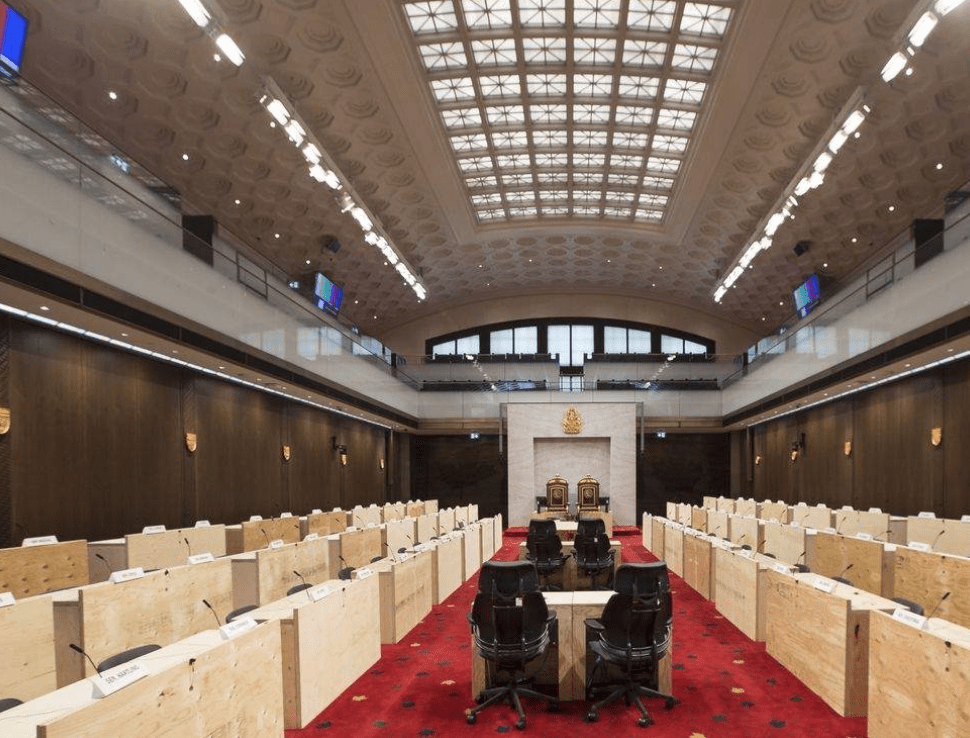At this point, three private members' bills that the government was counting on are looking like they'll die on the Order Paper. Despite my predictions that the Senate would wind up sitting into July, bills have been moving through both Chambers at such a clip that both aim to rise by the end of this week, but with one proviso that those three bills are going to die. Of course, there is nothing to say that the Senate has to rise right away, and they could have sat for as long as it took for them to get to those three bills after all of the government bills passed, but right now, the direction from the Leader of the Government in the Senate err, "government representative," Senator Peter Harder, is that he is willing to let them die, and in a stunning bit of news, he announced that the government planned to campaign on making Bill C-262, which would ensure that Canadian laws comply with the United Nations Declaration on the Rights of Indigenous Peoples (UNDRIP) into law.
First of all, let it sink in for a moment that Harder, who insists that he is "non-aligned" and independent of the government (while similarly engaging in the half-pregnant fiction that he is also their representative), is announcing campaign promises on the floor of the Senate. Had Harder been a member of Cabinet as his position is supposed to be, this would not be an issue, but they continue to operate under the polite fictions that they are. Nevertheless, in his haste to ensure that Senators can leave Ottawa and head home for the summer, he has given up on trying to do any horse-trading to get these bills passed, and it sounds like some of the senators championing these bills among the Independent Senators Group weren't able to convince their fellows to stay around either.
Nevertheless, I'm not sure that we should mourn any of these three bills, because they were all problematic. Bill S-228 was originally a bill from Senator Nancy Green Raine to ban advertising junk food to children, but it was overbroad and had lawyers across the country raising red flags. The government nevertheless decided it was something they could support, and amended it heavily in the House of Commons to make it palatable, but it has languished in the Senate since September as they consider those amendments. Bill C-262 is the aforementioned UNDRIP bill, but it was also problematic in its drafting none of the language was consistent with actually implementing international laws or treaties into Canadian statute, and was mostly a symbolic bill that would simply say the government would ensure that its laws were consistent, but did little else. The final bill was C-337, which was Rona Ambrose's bill to ensure that future judges had sexual assault law training.
Of the three bills, Ambrose's was most problematic, and was very likely unconstitutional because it impacted on judicial independence. It got no proper review in the House of Commons no critical debate, it was sent to the Status of Women committee instead of the Justice committee, which didn't have the proper competence to raise any issues with it, and it passed unanimously on sentiment alone. It wasn't until it got to the Senate that its problems were spelled out constitutionality aside, it put lawyers in an awkward position of trying to get their training without alerting their firms that they were applying to be a judge, if training was available in their region at all; it was overbroad in its reach because the proportion of federally-appointed judges who deal with sexual assault law to begin with is fairly low; and it also put impartiality of future decisions in question because it mandated that the training needed to be done by survivors groups, who are generally called upon as expert witnesses, meaning that it could taint future trials. It was not a good bill.
Once C-262 and C-337 were in the Senate, they became subject to the rules of the Senate no matter that the government supported them, as private members' business, they are not priority, and given that the government had an ambitious agenda of legislation going through the relevant Senate committees, these bills were not going to get time for study anytime soon. There are no procedural mechanisms to prioritize them outside of an extraordinary motion, which C-337 eventually got, but it was also with the proviso that it would be done with amendments to make the bill palatable (but in doing so largely turned it into a symbolic bill, since the Canadian Judicial Council is already doing the training that the bill demands). The backstory here, however, is that there were Conservatives in the Senate who knew the bill would need amendments and tried to get Ambrose to work with them on it, and she refused, preferring to get uncritical interviews on the national politics shows, who couldn't be bothered to do the literal twenty minutes of research as to why there were problems with the bill. (I know it was twenty minutes because I timed myself when I researched the second reading debates in the Senate).
With C-262, the horse-trading in the Senate was that the Conservatives would allow it to go to committee on the promise that ministers Carolyn Bennett and David Lametti appear before them to explain why they used to object to the bill and suddenly decided to support it. The ministers then reneged on the promise to appear, which was then followed by a shocking display during clause-by-clause consideration of the bill when Liberal and Independent senators on the committee limited Conservative interventions and even had Senator Tkachuk removed from the room, which is now the subject of a question of privilege.
After that were more procedural shenanigans on the Commons side, when they passed a resolution to tie C-262 and C-337 together, and demand that the Senate pass those bills something the Commons has no authority to do. That the Conservatives in the Commons didn't object means that they shackled their Senate colleagues to a bill they didn't support (C-262) with one that they ostensibly did (C-337), which sealed their fates. With the Conservatives determined not to pass C-262, both because they objected to the contents (under the belief it amounted to an Indigenous veto on all future projects) and the fact that the government broke their promise to have the ministers appear, not to mention the antics at the committee during clause-by-clause, it meant that C-337 would share its fate.
Is there a lesson to be learned here? There are a few. One is that Cabinet should not reach into the Senate and try to meddle with legislation without an awareness of how its rules operate (and if they had a competent Cabinet minister as Leader of the Government in the Senate, that would certainly help). Another is that negotiations for the passage of bills should be undertaken in good faith, which was apparently not the case. If the government feels strongly about these bills, they should make them their own with actual government legislation drafted by the Department of Justice, to ensure that the constitutionality is sound. And while there will be an outcry over the deaths of these bills, we should remark that they were not good bills to begin with, as feel-good as they were, and that kind of sentimentality has no place on the statute books of this country.
Photo Credit: CBC News








